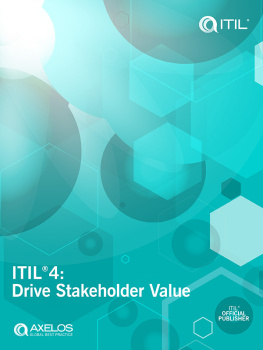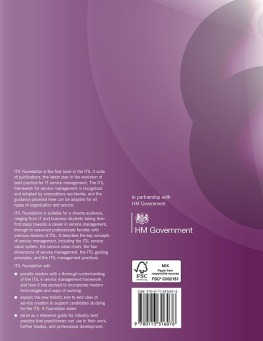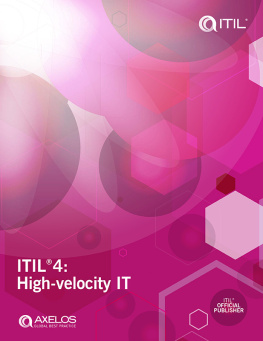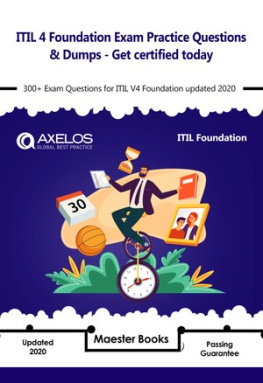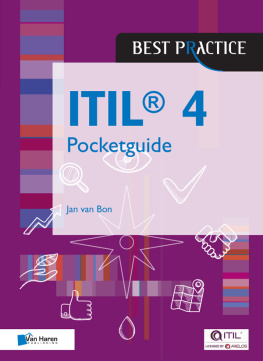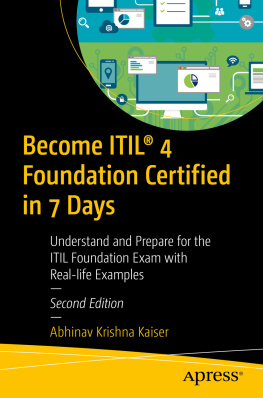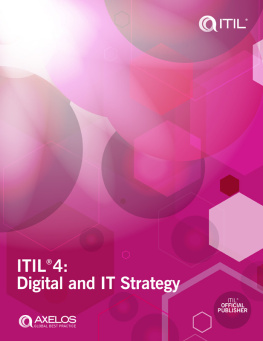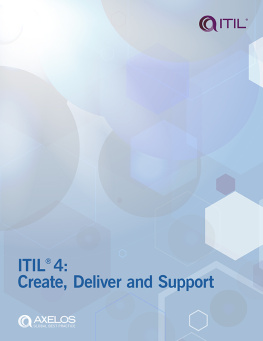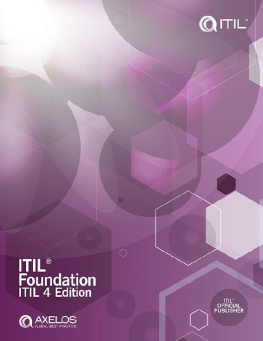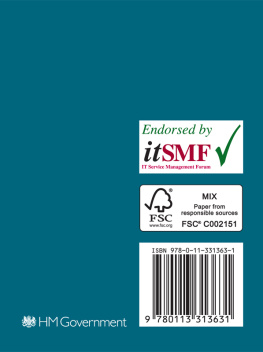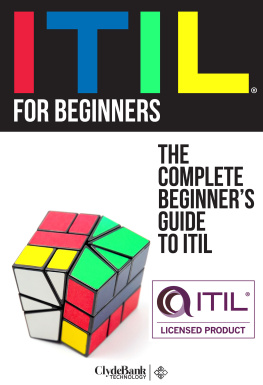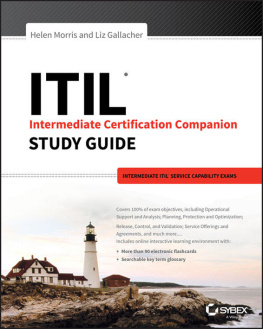
ITIL 4: Drive Stakeholder Value


Published by TSO (The Stationery Office), part of Williams Lea, and available from:
Online
www.tsoshop.co.uk
Mail, Telephone, Fax & E-mail
TSO
PO Box 29, Norwich, NR3 1GN
Telephone orders/General enquiries: 0333 202 5070
Fax orders: 0333 202 5080
E-mail:
Textphone 0333 202 5077
and other Accredited Agents
AXELOS
Full details on how to contact AXELOS can be found at:
https://www.axelos.com
For further information on qualifications and training accreditation, please visit:
https://www.axelos.com/certifications
Copyright AXELOS Limited 2020
All rights reserved. No part of this publication may be reproduced in any form or by any means without permission in writing from AXELOS Limited.
Applications to reuse, reproduce or republish material in this publication should be sent to the licensing team at:
Registered office address: 30 Berners Street, London, England, W1T 3LR
AXELOS, the AXELOS logo, the AXELOS swirl logo, AgileSHIFT, ITIL, MoP, M_o_R, MoV, MSP, P3M3, P3O, PRINCE2, PRINCE2 Agile, and RESILIA are registered trade marks of AXELOS Limited.
Figure 2.4: adapted with permission of McGraw-Hill Inc. from Of Human Interaction by Joseph Luft (1969). Permission conveyed through Copyright Clearance Center Inc.; adaptation used by permission of MindTools.
Figure 2.5: reproduced from Meyer, E. (2014) Navigating the cultural minefield. Harvard Business Review 92(5): 119123. Copyright 2014 by Harvard Business Publishing.
First edition 2020
ISBN 9780113316366
Printed in the United Kingdom for The Stationery Office
Material is FSC certified and produced using ECF pulp, sourced from fully sustainable forests.
P003017333 c20 02/20
List of figures
List of tables
Foreword
At this new stage in the development of the IT industry, AXELOS is delighted to present ITIL 4, the latest step in the evolution of IT best practice. By building on our experience and bringing fresh and forward-looking thinking to the marketplace, ITIL 4 equips your business to deal with the challenges currently faced by the industry.
The adoption of ITIL as the most widely used guidance in the world on IT and service management will continue with ITIL 4. It ensures continuity with existing ways of working (where service management is already successful) by integrating modern and emerging practices with established and proven know-how. ITIL 4 also provides guidance on these new methods to help individuals and organizations to see their benefits and move towards using them with confidence, focus, and minimal disruption.
ITIL 4s holistic approach raises the profile of service management in organizations and industries, setting it within a more strategic context. Its focus tends to be on end-to-end product and service management, from demand to value.
ITIL 4 is the result of a great deal of global research and development work across the IT and service management industries; this work has involved active practitioners, trainers, consultants, vendors, technicians, and business customers. The architect team has collaborated with the wider stakeholders and users of ITIL to ensure that the content meets the modern requirements of continuity, innovation, flexibility, and value.
ITIL training provides individuals with a structured approach for developing their competencies in the current and future workplace. The accompanying guidance also helps organizations to take advantage of the new and upcoming technologies, succeed in making their digital transformations, and create value as needed for themselves and their customers.
ITIL4: Drive Stakeholder Value covers all types of engagement and interaction between a service provider and its customers, users, suppliers, and partners. It explores the various steps organizations can take in order to drive stakeholder value, including (but not limited to) fostering various types of relationships, understanding markets and stakeholders, and capturing and realizing value. The guidance also deals with the conversion of demand into value through IT-enabled services, providing readers with the necessary tools to increase stakeholder satisfaction (which is integral to the success of a business in the current competitive climate). It can be adopted and adapted in all types of organizations, helping to establish, maintain, and develop an effective service relationship at an appropriate level.
Welcome to the new generation of IT best practice!

Mark Basham
CEO, AXELOS Global Best Practice
Preface
Welcome! This guide will take you on an amazing journey of co-creating value through services, and is aimed at both customers and service providers. The guide is for everyone: large well-organized groups, families, backpackers, hitchhikers, travellers who prefer a meticulously planned journey, and those who seek a more spontaneous and emerging experience. You can travel with us all the way, or join us for just part of the journey.
Services are not manufactured or produced but co-created between two or more stakeholders. The service experience is formed by individual touchpoints and service interactions on the journey as well as by the journey as a whole. To improve stakeholder satisfaction, each touchpoint should lead to a good experience, and the whole journey should meet or exceed the stakeholders expectations.
The purpose of this guide is to optimize the value of the service journey for all involved stakeholders by converting opportunity and demand into value. In other words, to drive stakeholder value. All stakeholders contribute to the creation of service value by:
exploring value propositions
fostering relationships
keeping engagement channels open
shaping demand
designing service offerings
aligning with and agreeing on expectations
co-creating service experiences
realizing value.
ITIL4: Drive Stakeholder Value provides recommendations for how to engage in and contribute to each of these activities. It discusses the main stepping stones of the service journey and shows you how to make the journey valuable for service consumers, service providers, and all other stakeholders.
Adopting a service mindset is a good start for both the customer and the service provider. So, when moving forward on the service journey, consider the following five Ss at every stage of the journey:
Smile, serve and support.
Seek first to understand then to be understood.
Seize the moment of truth.
Save time for the unexpected.
Say sorry when you make a mistake (too much rather than too little).
We are now ready for boarding. Have a safe trip!

Christian Feldbech Nissen
Lead editor, ITIL 4: Drive Stakeholder Value

